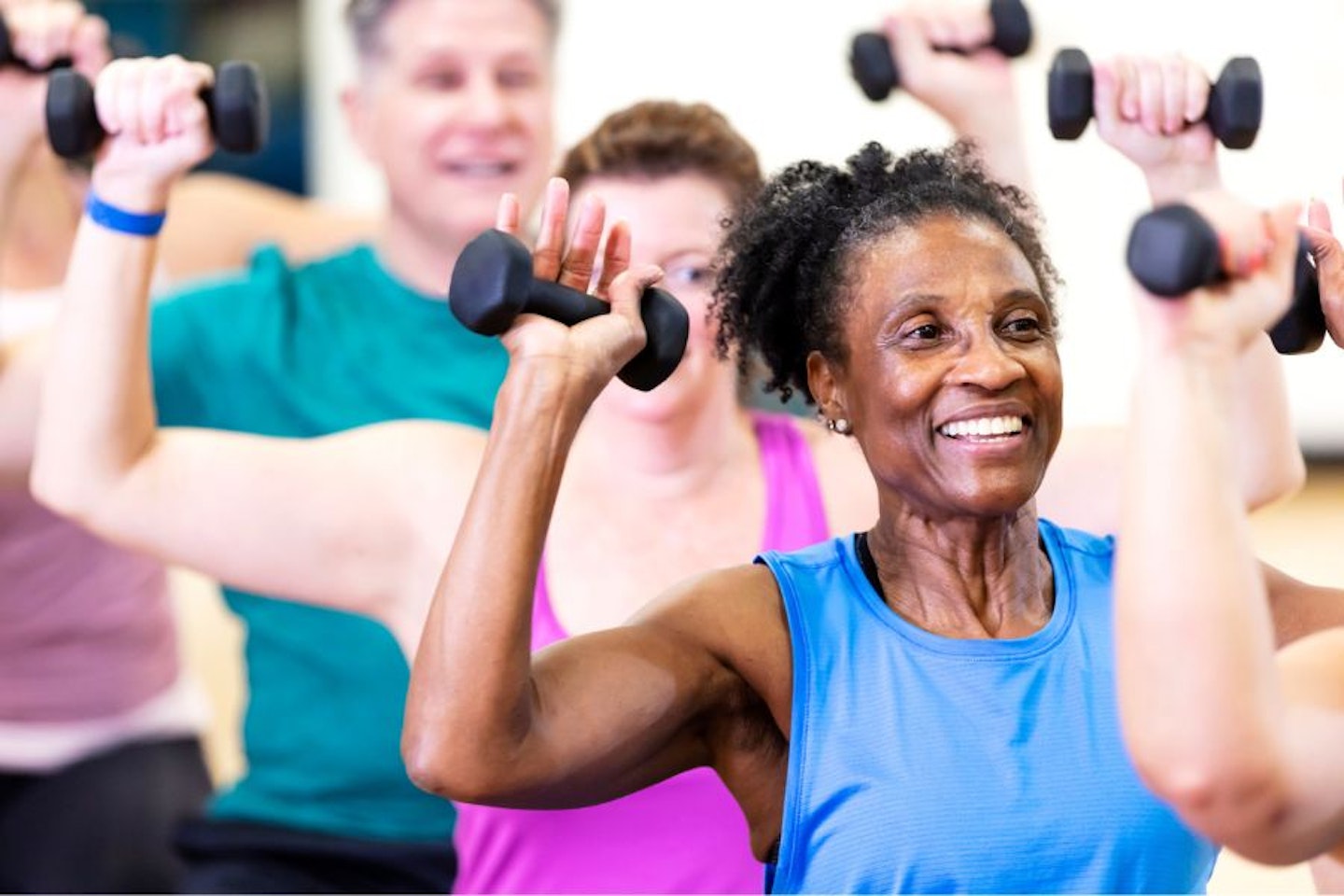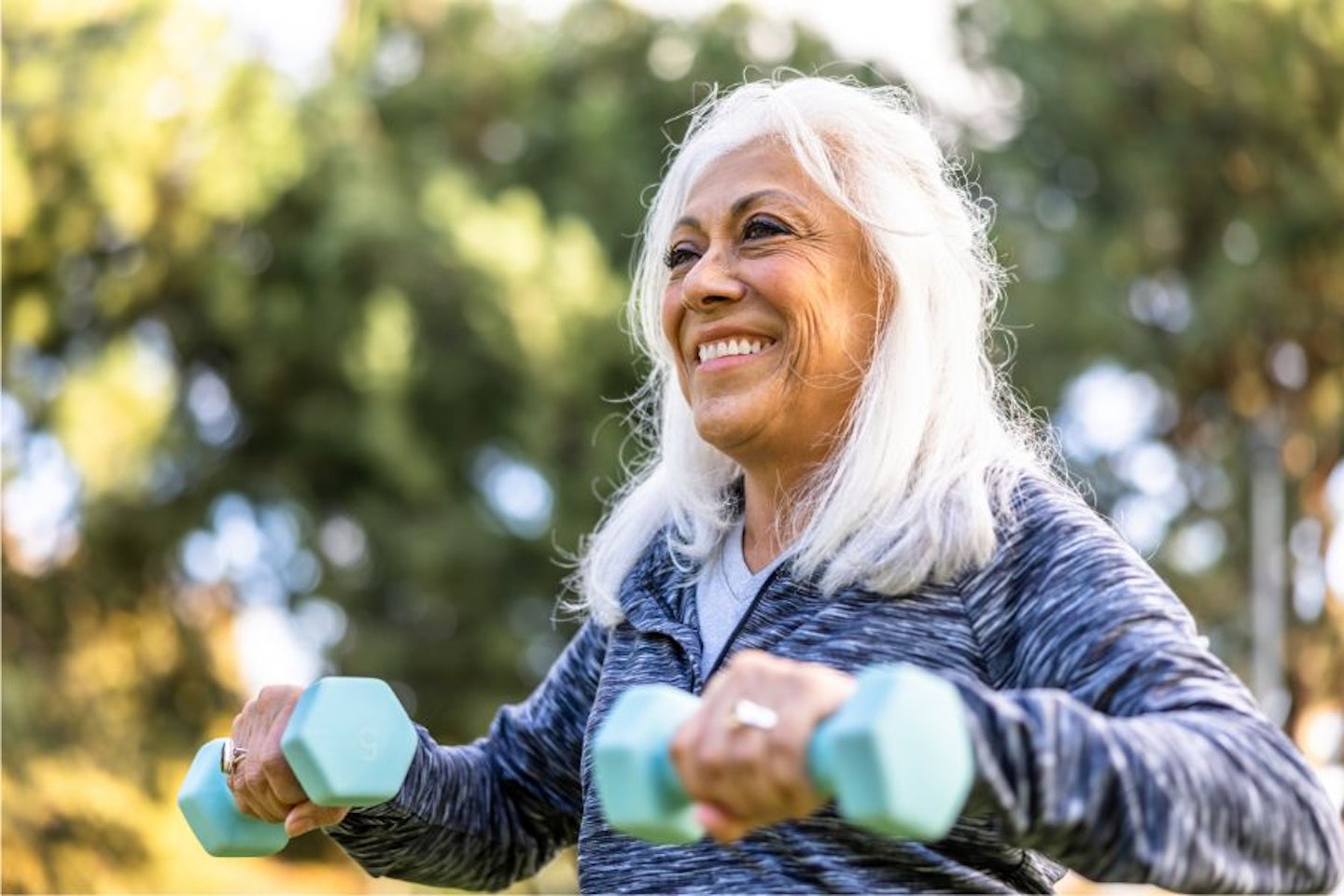Our resident fitness trainer talks you through how to use weights at home to build strength, improve mobility, and tone up. Plus there's a 5 move beginner workout for us to try.
The idea of weight training at home for ladies – or indeed anywhere else- might seem daunting, but it doesn’t have to be. Lifting weights on a regular basis should be a priority for women over 50, as it helps protect against so many health and mobility conditions.
As well as being senior writer for Yours, I'm a qualified personal trainer and strength coach who specialises in fitness for over 50s. I've helped hundreds of women learn how to use dumbbellsand other weights at home to improve their fitness.
Working out at home is ideal for me and many of my clients for a number of reasons. For me, it saves time. I can fit an hour workout in at home in my living room, whereas if I had to drive to the gym and back, my actual exercising time would be reduced to half an hour. Some feel too self-conscious in a gym, and the privacy of weight training at home for ladies is preferable. Others like to build confidence at home and then try a group exercise class, and some just like to crank their own choice of music up loud and start the day lifting some weights.
Why should I use weights?
When we talk about weightlifting, everyone always things of big, bulky men lifting weights in a gym. But the fact is, some kind of strength training should form part of everyone’s exercise regime, because the benefits are huge. For older adults, the NHS recommends a minimum of two strengthening sessions per week. This can help prevent osteoporosis and osteoarthritis by improving bone density. It can also help aid weight loss, lower blood pressure, improve balance and mobility and lower the risk of type-2 diabetes.
Strength training can take many forms. The important thing is to create some kind of resistance – or opposable force- for your body to move against. You might use adjustable dumbbells, kettlebells, or resistance bands. You might use your own bodyweight to create resistance in moves such as a squat, lunge, or push-up. However you do it, it's never too late to start seeing the benefits.
Rowan Feilden-Cook, Personal Trainer and Mindset Coach at The SHE Collective says, “Weights are incredibly helpful with gaining functional fitness. This is the kind of fitness that benefits you in day-to-day life, for example doing household chores such as hoovering or carrying shopping bags. Once your functional fitness improves, you will find it easier to achieve these tasks and as a result you are likely to do more of them, which will in turn, will improve your fitness – it's a full circle.”
Aside from the evidence that adding weights into your routine will improve strength, Rowan lists several other advantages: “Weights help with confidence on a number of levels. Firstly, after using them for a while, you will notice the physical changes – more energy, feeling stronger, clothes fitting better. But you will also notice the mental changes: lifting weights is an extremely empowering wellbeing activity, it reduces your cortisol (stress) levels and increases your endorphins.”

What are weight training exercises?
The good news is, you're probably already doing some form of weight training in your everyday routine. Things like carrying the shopping in from the car, lifting grandchildren, or putting things away in cupboards. Even standing and sitting is essentially a squat.
Getting started doesn't need to be expensive - the beginners workout below can be done without any weight or you can hold cans of beans or full water bottles, for example. As you progress, you may want to buy a set of dumbbells. These can often be picked up in a supermarket, on Amazon, or in stores such as Argos. I always recommend the Songmics hex dumbbells set from Amazon.
Rowan tells us that we’re not aiming to lift something back-breakingly heavy: “The key is that you need enough weight to create "progressive overload' – this is where the muscle fibres are overloaded and therefore break down and grow back stronger.”
How to start lifting
You might be feeling ambitious but learning how to use weights is not an overnight process. Rowan warns: “You should also be careful to not lift anything too heavy so that it causes injury – a good starting point is to be able to achieve 10-12 unbroken repetitions of an exercise with your chosen weight.”
She adds, “The key is to start small and once you feel comfortable with lifting household objects repeatedly and have the correct form, then progress onto weights."
Avoid lifting weights every day. Rowan explains: “When you are starting out it is far better to start slowly and for short amounts of time. If you do too much too soon, you are likely to experience more setbacks with injuries and a quick dip in motivation. Instead, set yourself up for success. Aim to do just 10 minutes 2/3 times in the first week and build from there. The motivation will come when you start to gain the consistency and feel the results so stick at it, and remember, this is a long game not a short fix.”
When you are performing any exercise, comfort is key. As Rowan says, “Focus on being comfortable. There is no need for expensive clothing or footwear, as long as you can move easily and have good grip, (perhaps with weightlifting gloves) pretty much anything goes.”

Will weights tone up the areas I want to improve?
Weight training for ladies is a great way to change your physical appearance if you want to, but it’s better to think of it as a good way to improve your overall health. A lot of changes will take place that aren’t visible – your heart health will improve, as will your circulation. You’ll gain confidence and your mood will be lifted.
If you have specific areas of the body you’re concerned about, such as the appearance of your upper arms, for example, then once you’re familiar with weight training you can start to add in more arm movements. But it’s important to remember that you can’t spot reduce fat – you’ll lose it from your body as an overall by-product of weight training. What you’ll also do, is build muscle.
Lifting weights at home can be a great way to aid weight loss, since it fires up our metabolism. Unlike cardio exercise, weight training keeps our metabolism burning at a slightly higher rate for quite some time afterwards, too.
However, the only way to lose weight is if you create a calorie deficit – you burn more than you consume. This can be achieved through diet, exercise, or a combination of both. If you want to lose weight, it’s important to look at your nutrition as well.
It’s also worth noting that there are so many other more important metrics to focus on than the scale. Lifting weights will help you to build muscle. Contrary to popular belief, muscle does not weigh more than fat. It does, however, take up less space on your body, so you can carry more muscle, and weigh heavier, but look much smaller.
What matters is how you feel. Do your clothes fit? Do you look in the mirror and feel happy? Are you able to move around with ease, go about your daily activities and enjoy regular exercise? If the answer to these questions is yes, then focus on those positives rather than a number on the scale.
Try this 5-move beginner workout from our fitness trainer
Try this 5-move workout I've created to get started with lifting weights at home. Start by learning the moves without weights, then add them in when you feel confident.
As always, if you have any pre-existing health condition, consult your doctor before starting a new exercise regime.
Squat
-
Stand with your feet hip-width apart.
-
Squat down, as if you’re sitting into a chair, pushing your knees out as you do so.
-
Drive your feet into the floor and push back up to standing, squeezing your glutes (bum muscles) as you do so.
-
Repeat for 10-15 repetitions.
-
Don’t rush the movement – squats are always slow to go down, quick to come up.
-
Aim to get your hips parallel with your knees.
-
Add weight when ready – either one weight held centrally or a weight in either hand down by your side.
-
Make this easier: Squat down onto a sturdy chair each time.
Lunge
-
Stand with your feet directly under your hips.
-
Take one leg backwards, bending the knee towards the floor.
-
Let the front leg bend to a maximum of 90-degrees.
-
Push into the front foot and bring the back leg up to meet it again.
-
Repeat on the other side. Do 20 repetitions total (10 per side).
-
Add weight when ready - either one weight held centrally or a weight in either hand down by your side.
-
Make this easier – reduce the range of motion by taking a smaller step back and not dropping the knee so far.
Push-up
-
Firstly – YES, you can!
-
Kneel on all fours on a stable surface, hands slightly wider than your chest.
-
Extend one leg behind you (toes on the floor), then the other, so you’re in a plank position.
-
Then put your knees down on the floor, like the picture above.
-
Let your elbows bend at a 45-degree angle out from the body as you lower your chest towards the floor, then push into the floor with your hands to drive back up.
-
Repeat for 8-10 repetitions.
-
Don’t leave your bum behind! Try to get all your body moving as one.
-
Make this easier: You can do these push-ups against a wall (easiest), or on an incline. I’ve used a solid dining table and a mantelpiece before. Just make sure it’s a secure surface.
Row
-
Stand with a weight in one hand, bending at the waist and slightly at the knees, place your other hand on a flat surface such as a bench.
-
‘Row’ the weight up towards your hip, letting your elbow come up, but keeping it close to your side.
-
Lower it back down until your arm is fully extended, and repeat.
-
Do 12 repetitions each side.
-
Be careful to keep a flat back, don’t let it round out.
-
Make this easier: Use a higher surface for support, for example you could place your other hand on a windowsill.
Lateral raise
-
Stand with your feet hip width apart, a dumbbell in each hand at your side.
-
Keeping a soft bend in the elbows, lift the weights up to shoulder height then lower.
-
Repeat for 8-10 repetitions.
-
Shoulders and ears aren’t friends – don’t shrug your shoulders as you lift.
-
Make this easier: Do one arm at a time.
Becky Fuller is a senior digital writer for Yours.co.uk. She is also a fully qualified personal trainer and strength coach, specialising in fitness and wellbeing for over 50s. Prior to joining Yours, Becky was a fitness writer for Saga, and a freelance entertainment and theatre journalist. Becky is passionate about helping people to move well and discover the many benefits of strength training.
Rowan Feilden-Cook is a Personal Trainer and Mindset Coach with the SHE Collective who is both pre and post-natal qualified.
